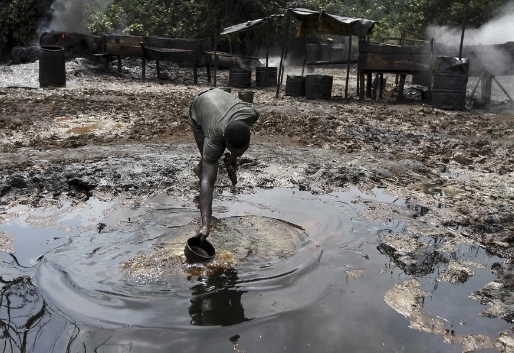Nigeria’s southern Bayelsa state is grappling with the devastating environmental consequences of decades-old oil exploration, requiring a staggering $12 billion for a 12-year cleanup, according to a recent report.
The report places the majority of the blame on Shell and Eni, two major oil companies operating in the region, for the extensive pollution and ecological damage.
Bayelsa is a significant oil-producing state located in the Niger Delta, an area plagued by pollution, conflicts, and corruption linked to the oil and gas industry.
The oil majors in Nigeria have frequently faced legal battles over oil spills in the Niger Delta, often attributing them to pipeline sabotage, vandalism, and illegal refining.
In 2019, the Bayelsa State Oil and Environmental Commission initiated an investigation into the impact of spills in the region, utilizing evidence from forensic scientists, blood samples from affected individuals, and company data.
The commission’s findings were alarming, revealing that toxic pollutants from spills and gas flaring exceeded safe limits in soil, water, air, and even in the blood of local residents.
The commission’s report unequivocally implicates oil companies in failures of strategy, prevention, response, and remediation.
While the Shell Petroleum Development Company of Nigeria Limited stated it had not yet received the final report and refrained from commenting, an Eni spokesperson attributed the oil spills to theft for illegal refineries, illegal exports, and sabotage, asserting the company’s commitment to remedying all spills.
The report highlights the pervasive presence of toxins that cause burns, lung problems, and cancer risks, emphasizing that oil company-led clean-up efforts are often poorly executed, further contaminating the soil and groundwater.
Adopting a United Nations model used in the past to calculate clean-up costs in Ogoniland, another polluted region in the Niger Delta, the commission estimates that the Bayelsa clean-up will require $12 billion over a span of 12 years.
The pollution crisis in Ogoniland, despite a landmark $1 billion clean-up effort involving a U.N. agency, may be more severe than previously estimated, according to a group monitoring the project.
These alarming findings underscore the urgent need for global attention and partnership to mitigate the devastating environmental and human consequences of oil pollution in Bayelsa and the wider Niger Delta region.
To shed light on the dire situation, the Bayelsa State Oil and Environmental Commission is presenting its final report, titled “An Environmental Genocide: Counting the Human and Environmental Cost of Oil in Bayelsa, Nigeria,” to the international community.
The report’s presentation, scheduled to take place today at the House of Lords in London, aims to raise global awareness about the environmental degradation and its impact on the people of Bayelsa.
Renowned figures in governance and international development, including Baroness Valerie Amos and former Ghanaian President John Kuffuor, chair the Bayelsa State Oil and Environmental Commission.
Joining them at the event will be Bayelsa State Governor Douye Diri, Nigeria’s High Commissioner to the United Kingdom Amb. Sarafadeen Isola, environmentalist King Bubaraye Dakolo from the Ekpetiama Kingdom in Bayelsa, and former Archbishop of York Dr. John Sentamu, among others.
The gathering seeks to garner international support and collaborative efforts to address the environmental crisis and protect the people of Bayelsa from further harm.
